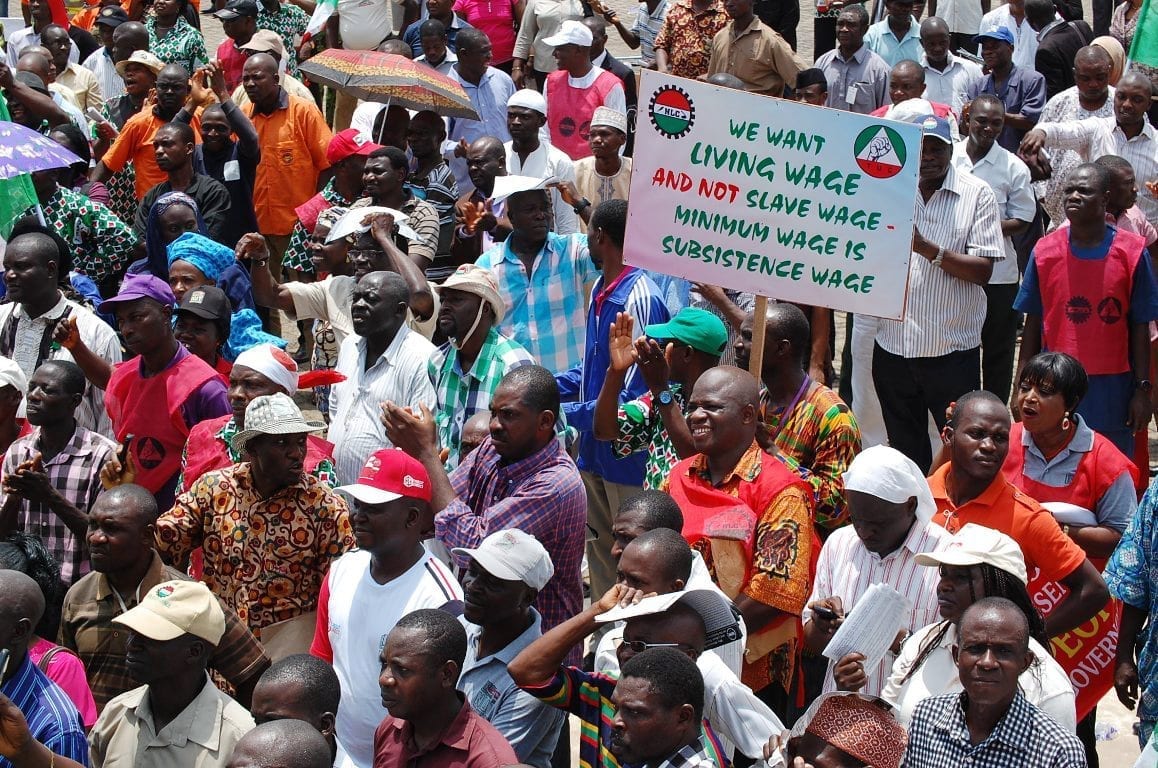The Nigeria Labor Congress (NLC), Trade Union Congress (TUC) and Joint National Public Service Negotiating Council (JNPSNC) are threatening to launch a nationwide strike October 16 unless the government implements a minimum wage adjustment for all public sector workers as mandated by a new minimum wage law signed by President Muhammadu Buhari more than five months ago.
Although many of Nigeria’s lowest-paid workers are receiving the 67 percent increase afforded to low-wage public-sector workers under the new law, an increase for public-sector workers at all but the lowest skill levels remains in contention. Even as an increasing number of Nigeria’s citizens slide into poverty, the government continues to withhold the increase for more skilled public-sector workers—a delay that is holding down private-sector wages as employers follow the government’s lead.
Workers at public-sector salary grades 7 and above, or those earning $85 per month or more, have not seen a true wage increase, unions say, because wages have not been adjusted to compensate for income eroded by inflation—which last year stood at 11 percent.
While the NLC and TUC are fighting for salary adjustments retroactive to implementation of the April 18 law, they are also embroiled in talks with the government regarding the reconvening of a committee that will negotiate a new minimum wage for workers at higher skill levels.
“To talk about setting up another committee over the same issue makes us feel we have been swindled. We have learnt our lessons,” said TUC president Quadri Olaleye and secretary-general Musa-Lawal Ozigi in a joint statement.
While Nigeria’s workers wait, poverty is on the rise. Nigeria overtook India last year as the country that is home to the most extremely impoverished people in the world. Working people have seen a steady erosion of their purchasing power due to double-digit inflation, with the cost of staple foods and other commodities rising steadily. While workers wait for their adjusted wage increase, gasoline prices rose from 24 cents to 40 cents per liter, and the cost of electricity increased by almost 60 percent, said unions. This month, after the Nigerian government closed borders to restrict rice imports, the cost of a bag of imported rice jumped by over 40 percent. According to the National Bureau of Statistics, 43 percent of Nigeria’s 190 million people are either unemployed or underemployed.
If a general strike is triggered, all public-sector institutions—including schools and hospitals–will be affected.
“We demand immediate implementation of the signed agreement on consequential adjustment of public workers’ salaries with effect from April 18 when the new national minimum wage of [$83] per month was signed into law,” said NLC president Ayuba Wabba, TUC president Quadri Olaleye and JNPSNC acting chairman Simon Anchaver in a statement.
Although workers accepted the country’s new minimum wage of $83 per month for those at the lowest skill levels—among them, cleaners, receptionists, security guards and gardeners—this amount falls far short of the $164 per month unions said would fairly compensate workers and help them survive under inflation. Nigeria’s unions have been engaged in a contentious, years-long effort to force government and employers to respond to workers’ pleas for a living wage.
A threatened general strike in October 2018 was called off only hours before it was scheduled to begin, after the country’s wage committee agreed to increase the minimum wage from around $50 per month to $83. A second general strike was called off in January this year after passage of the new national minimum wage bill through the National Assembly was delayed.

